九年级上册英语Unit3 知识点归纳整理
九年级上册笔记英语第三单元
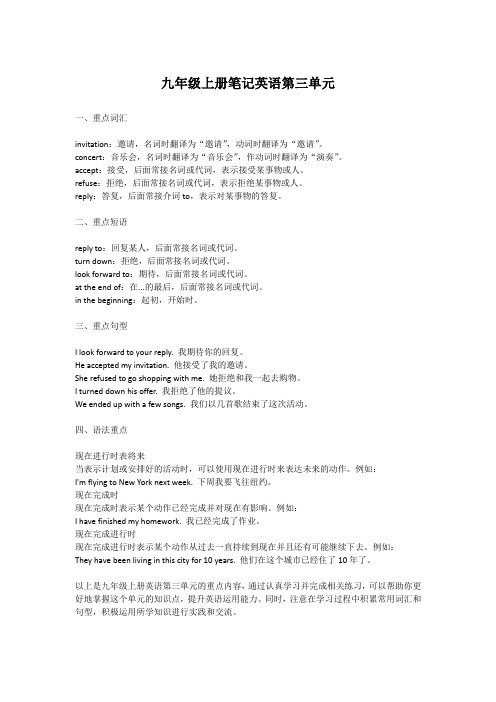
九年级上册笔记英语第三单元一、重点词汇invitation:邀请,名词时翻译为“邀请”,动词时翻译为“邀请”。
concert:音乐会,名词时翻译为“音乐会”,作动词时翻译为“演奏”。
accept:接受,后面常接名词或代词,表示接受某事物或人。
refuse:拒绝,后面常接名词或代词,表示拒绝某事物或人。
reply:答复,后面常接介词to,表示对某事物的答复。
二、重点短语reply to:回复某人,后面常接名词或代词。
turn down:拒绝,后面常接名词或代词。
look forward to:期待,后面常接名词或代词。
at the end of:在...的最后,后面常接名词或代词。
in the beginning:起初,开始时。
三、重点句型I look forward to your reply. 我期待你的回复。
He accepted my invitation. 他接受了我的邀请。
She refused to go shopping with me. 她拒绝和我一起去购物。
I turned down his offer. 我拒绝了他的提议。
We ended up with a few songs. 我们以几首歌结束了这次活动。
四、语法重点现在进行时表将来当表示计划或安排好的活动时,可以使用现在进行时来表达未来的动作。
例如:I'm flying to New York next week. 下周我要飞往纽约。
现在完成时现在完成时表示某个动作已经完成并对现在有影响。
例如:I have finished my homework. 我已经完成了作业。
现在完成进行时现在完成进行时表示某个动作从过去一直持续到现在并且还有可能继续下去。
例如:They have been living in this city for 10 years. 他们在这个城市已经住了10年了。
以上是九年级上册英语第三单元的重点内容,通过认真学习并完成相关练习,可以帮助你更好地掌握这个单元的知识点,提升英语运用能力。
人教版九年级英语上册课件:Unit 3单元知识归纳(共11张PPT)
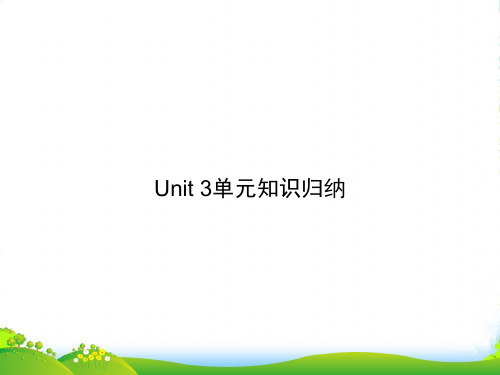
• Ⅲ.经典句型 • 1.Could you please tell me where the
restrooms are?
• 请问你能告诉我洗手间在哪里吗? • 2.Excuse me...劳驾,打扰一
下…… • 3.Just go along Main Street until you
pass Center Street. • 就沿着大街走直到你通过中心街。 • 4.Pardon?请再说一遍好吗?
• 5.You don’t need to rush.你不必急赶。
• 6.Come on!开始;快点;前进;开始 工作!
• 7.Shouting did help.高呼真的有帮助。 • 8.The sign says a rock band plays
here every evening.
• 牌子上写着每晚有摇滚乐队在此演出。
Unit 3单元知识归纳
• Ⅰ.词形变换 • 1.suggest→(名词)suggestion • 2.central→(名词)center • 3.east→(形容词)eastern • 4.polite→(副词)politely • 5.direct→(名词)direction • 6.correct→(副词)correctly • 7.speak→(名词)speaker
• 8.between...and...在…… 与……之间
• 9.go past...从……的旁边过去 • 10.start/begin with以……开始 • 11.over there在那边 • 12.go on the new ride坐新的游乐设施 • 13.be special about关于……特别的 • 14.hold one’s hand抓住某人的手 • 15.at first起初 • 16.on one’s way to在去……的路上
2024九年级英语上册Unit3必背知识点
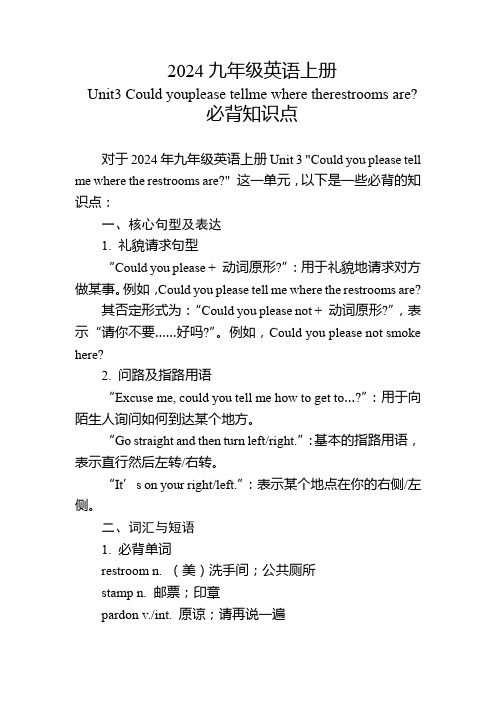
2024九年级英语上册Unit3 Could youplease tellme where therestrooms are?必背知识点对于2024年九年级英语上册Unit 3 "Could you please tell me where the restrooms are?" 这一单元,以下是一些必背的知识点:一、核心句型及表达1. 礼貌请求句型“Could you please + 动词原形?”:用于礼貌地请求对方做某事。
例如,Could you please tell me where the restrooms are?其否定形式为:“Could you please not + 动词原形?”,表示“请你不要……好吗?”。
例如,Could you please not smoke here?2. 问路及指路用语“Excuse me, could you tell me how to get to…?”:用于向陌生人询问如何到达某个地方。
“Go straight and then turn left/right.”:基本的指路用语,表示直行然后左转/右转。
“It’s on your right/left.”:表示某个地点在你的右侧/左侧。
二、词汇与短语1. 必背单词restroom n. (美)洗手间;公共厕所stamp n. 邮票;印章pardon v./int. 原谅;请再说一遍suggest v. 建议;提议direction n. 方向;指导correct adj. 正确的direct adj. 直接的;adv. 径直地address n. 地址politely adv. 礼貌地central adj. 中心的;中央的2. 常用短语get some information about... 获取关于……的信息go straight 直走turn left/right 向左转/向右转take the first/second/third turning 在第一个/第二个/第三个路口转弯on one’s left/right 在某人的左边/右边be polite to... 对……有礼貌三、语法知识1. 宾语从句在本单元中,where引导的宾语从句是重点。
九年级英语unit3知识点归纳
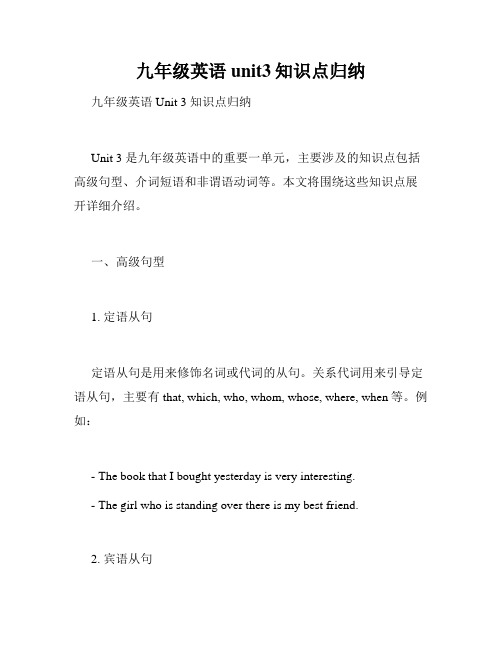
九年级英语unit3知识点归纳九年级英语Unit 3 知识点归纳Unit 3 是九年级英语中的重要一单元,主要涉及的知识点包括高级句型、介词短语和非谓语动词等。
本文将围绕这些知识点展开详细介绍。
一、高级句型1. 定语从句定语从句是用来修饰名词或代词的从句。
关系代词用来引导定语从句,主要有that, which, who, whom, whose, where, when等。
例如:- The book that I bought yesterday is very interesting.- The girl who is standing over there is my best friend.2. 宾语从句宾语从句是在主句中作为宾语的从句。
常用的引导词有that, whether, if等。
例如:- I don't know if it will rain tomorrow.- She asked me whether I had finished my homework.3. 状语从句状语从句是用来修饰主句的副词从句,常用的引导词有when, while, after, before, since, until等。
例如:- He always listens to music while he is doing his homework.- I will call you back as soon as I finish my work.二、介词短语介词短语在句中起着修饰或者指示的作用,可以表达时间、地点、原因、方式等。
常见的介词短语有at, in, on, of, for, with, by等。
例如:- I will meet you at the park tomorrow.- She is good at playing the piano.三、非谓语动词非谓语动词是指在句子中作为非主谓部分的动词形式,包括动词不定式、动名词和现在分词。
九年级英语上册Unit3知识点归纳
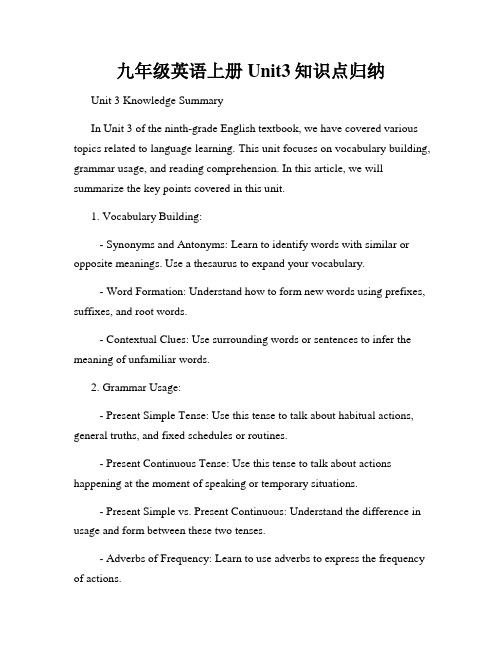
九年级英语上册Unit3知识点归纳Unit 3 Knowledge SummaryIn Unit 3 of the ninth-grade English textbook, we have covered various topics related to language learning. This unit focuses on vocabulary building, grammar usage, and reading comprehension. In this article, we will summarize the key points covered in this unit.1. Vocabulary Building:- Synonyms and Antonyms: Learn to identify words with similar or opposite meanings. Use a thesaurus to expand your vocabulary.- Word Formation: Understand how to form new words using prefixes, suffixes, and root words.- Contextual Clues: Use surrounding words or sentences to infer the meaning of unfamiliar words.2. Grammar Usage:- Present Simple Tense: Use this tense to talk about habitual actions, general truths, and fixed schedules or routines.- Present Continuous Tense: Use this tense to talk about actions happening at the moment of speaking or temporary situations.- Present Simple vs. Present Continuous: Understand the difference in usage and form between these two tenses.- Adverbs of Frequency: Learn to use adverbs to express the frequency of actions.- Question Words: Familiarize yourself with interrogative words such as who, what, when, where, why, and how.- Comparative and Superlative Forms: Understand how to compare two or more things using the correct forms of adjectives or adverbs.- Prepositions of Place: Learn to use prepositions correctly to describe the location of objects or people.3. Reading Comprehension:- Skimming and Scanning: Develop the skill of quickly reading for the main idea or specific details.- Identifying the Topic Sentence: Recognize the sentence that introduces the main idea of a paragraph.- Inference: Draw logical conclusions based on the information given in the text.- True, False, Not Given Questions: Practice understanding the nuances of information and determining if statements are true, false, or cannot be determined.- Multiple Choice Questions: Improve your ability to select the most appropriate answer from a given set of options.By mastering the vocabulary, grammar, and reading comprehension skills covered in Unit 3, you will enhance your English language proficiency. Regular practice and application of these knowledge points will enable you to communicate effectively and understand English texts more easily.Remember, language learning requires continuous effort and practice. Stay motivated and make use of various resources like textbooks, online materials, and language apps to further develop your English skills. Keep up the good work and best of luck in your language learning journey!。
九年级上册unit3知识点

九年级上册unit3知识点九年级上册 Unit 3 知识点本单元主要涵盖了九年级上册的 Unit 3 知识点。
以下将以核心内容为线索,介绍本单元的重点知识。
一、时态本单元主要学习了英语中的过去进行时和将来进行时。
过去进行时表示过去某个时间正在进行的动作或状态,结构为“was/were + 动词-ing”。
将来进行时表示将来某个时间正在进行的动作或状态,结构为“will be + 动词-ing”。
二、被动语态被动语态是英语语法中常用的一种语态。
被动语态的结构为“be + 过去分词”,通过被动语态可以强调动作的承受者而非执行者。
三、定语从句定语从句是用来修饰名词或代词的句子,一般由关系代词(如who、which、that等)引导。
在定语从句中,被修饰的名词或代词被称为先行词。
四、情态动词情态动词是表示说话人在某种程度上表达个人观点、态度、意愿等的动词。
常见的情态动词包括can、could、may、might、shall、should、will、would、must等。
五、分词分词是一种不完整的动词形式,既具有动词的性质,又可以作其他成分使用。
常见的分词形式有现在分词(动词+ing)和过去分词(一般为动词的过去式形式)。
六、形容词和副词的比较级和最高级形容词和副词有原级、比较级和最高级的变化形式,用于表示程度或比较关系。
一般情况下,单音节形容词和副词在原级后直接加-er(比较级)和-est(最高级)。
而多音节和部分双音节形容词和副词则在前面加more(比较级)和most(最高级)。
七、连词的用法连词主要用于连接不同的词、词组或句子,起到连接和衔接的作用。
常见的连词有并列连词(and、but、or等)、递进连词(also、besides等)、选择连词(either...or、neither...nor等)等。
八、倒装句倒装句是指将谓语动词或助动词调到主语之前的句子结构。
主要有完全倒装和部分倒装两种形式。
人教版英语九年级Unit 3 重点知识归纳及讲解

九年级上Unit 3知识清单Section A一、重点短语1. get some magazines/stamps买些杂志/邮票2. a pair of shoes 一双鞋3. ask for the information about the town 询问关于这个小镇的消息4. pass (by) a bookstore = go past/by a bookstore 走过一家书店5.beside the back = next to/ at the side of the bank 在银行旁边6. go to the second floor 去二楼7. get some postcards 买一些卡片8. try the rides 尝试些乘骑项目9. go on sth继续某事10.be excited to do sth兴奋地做某事be excited about sth/doing sth.11. start with = begin with 以...开始end with 以…结束12. hold my hand 抓住我的手13. come on 加油;得了吧14. walk up to 走向15. go east along 沿着…(向东)走16. on one’s way to sp在去某地的路上17. get angry 饿了18. at the door 在门口19. mail a letter 寄封信20. the Italian restaurant nearby 附近的意大利餐馆二、重点句型1. I was scared first, but shouting did help. 该句话中, “did”的用法是助动词表强调,起加强语气的作用。
同类例句如:I’m not joking, we did go camping last weekend. The summer holiday does start next Monday.2. 英语常见问路/指路表达方式:1) 问路Excuse me/Pardon me, where is the nearest post office?Excuse me, which is the way to the nearest post office?Excuse me/Pardon me, can/could you (please) tell me the way to the post office?Excuse me/Pardon me, how can I get to the nearest post office?Could you please possibly tell me how to get to the library?Excuse me/Pardon me, do you know if there’s a post office around here?Would you please tell me if there is a bank nearby?I wonder +…可加以上所有句型。
九年级英语上册第三单元知识点

九年级英语上册第三单元知识点Unit3 Could you please tell me where therestrooms are?一.短语归纳ed to do sth.过去常常做某事2.be afraid of害怕3.from time to time时常;有时4.turn red变红5.take up开始做,从事,占据(时间、空间)6.deal with对付;应付7.not…any more不再8.tons of attention很多关注9.worry about担心10.be careful当心11.hang out闲逛12.give up放弃13.thank about考虑14.a very small number of…极少数的……15.be alone独处16.give a speech做演讲二.用法集萃1.not……·until……直到……猜……You never know until you try something.2.let‘s do sth咱们做某事吧!3.spend time doing sth话费时间做某事4.thank sb for doing sth为做某事而感谢某5.would like to do sth想要做某事6.look forward to doing sth盼望做某事7.It seems(that)…It seems a rock band plays there every evening.8.Could you please tell me...?Could you please tell me how to get to the post office?9.take的用法①take some food take some medicine(=have吃,喝)②take notes做笔记③take one‘s temperature(测量)④It takes sb some time/money to do something(花费,需要)⑤I‘ll take this coat.(=buy购买)⑥take somebody/something to(带领,拿去,取)⑦take a train to Chongqing(乘坐)⑧take off(脱下)10.turn的用法turn to page 80翻到It is your turn.轮到你了。
九年级上册英语第三单元知识点总结

九年级上册英语第三单元知识点总结一、重点单词。
1. restroom.- 名词,意为“(美)洗手间;公共厕所”。
例如:I need to find a restroom.(我需要找个洗手间。
)2. stamp.- 名词,“邮票;印章”;也可作动词,“跺脚;盖章”。
- 作名词:He collects stamps.(他集邮。
)- 作动词:She stamped her foot angrily.(她生气地跺了跺脚。
)3. bookstore.- 名词,“书店”。
例如:There is a big bookstore near my school.(我学校附近有一家大书店。
)4. beside.- 介词,“在……旁边;在……附近”。
例如:The boy is standing besidehis mother.(那个男孩站在他妈妈旁边。
)5. postcard.- 名词,“明信片”。
例如:I sent a postcard to my friend.(我给我的朋友寄了一张明信片。
)6. pardon.- 可作名词,“原谅;宽恕;对不起”;也可作动词,“原谅;赦免”。
- 作名词:I beg your pardon.(请再说一遍。
)- 作动词:Pardon me for being late.(原谅我迟到了。
)7. washroom.- 名词,“洗手间;厕所”(尤指公共建筑物内的)。
例如:The washroom is on the second floor.(洗手间在二楼。
)8. bathroom.- 名词,“浴室;洗手间”。
例如:There is a bathtub in the bathroom.(浴室里有一个浴缸。
)9. normal.- 形容词,“正常的;一般的”。
例如:It's normal to feel tired after a long day.(漫长的一天后感到疲倦是正常的。
人教版英语九年级全册Unit3 单元知识点归纳

Unit3 单元知识点归纳一、重点词汇:stamp rush suggest mail convenient politely polite impolite request direction correct speaker二、短语:1. excuse me 劳驾,请原谅,打搅2. get to 到达3. get some magazines 得到一些杂志4. have dinner 吃晚餐5. get some information about 获取有关…….的一些信息6. a pair of 一双,一对,一副7. on one’s / the right 在右边8. turn left / right 向左/ 右拐9. between…..and….. 在…..和…..之间10. go past 经过,路过11. come on 快点儿,过来,加油12. on one’s way to 在某人去…….的路上13. a little earlier 早点儿14. the shopping center 购物中心15. a good place to eat 一个吃饭的好地方16. the corner of …….的角落/ 拐角处17. in different situations 在不同的情况下18. lead in to 导入,引入19. on time 准时,按时20. look forward to 盼望,期待21. pardon me 什么,请再说一遍三、固定短语:1. not…..until…… 直到…..才……2. Let’s do sth. 让我们做某事吧3. start doing sth. 开场做某事4. spend time doing sth. 花费时间做某事5. thank sb. for (doing) sth. 为〔做〕某事而感谢某人6. would like to do sth. 想要做某事7. look forward to doing sth. 盼望,期待做某事四、重点句型:1. Excuse me, could you please tell me how to get to the bookstore?打搅一下,请你告诉我如何去书店好吗?2. Excuse me, do you know where I can get some postcards?请问,你知道在哪里可以买到一些明信片吗?3. I wonder where we should go next.我想知道接下来我们应该去哪儿。
九年级英语上册Unit3知识点归纳

九年级英语上册Unit3知识点归纳九年级英语上册Unit3知识点归纳 1.取钱 get some money 2.买一些杂志/邮票 get/buy some magazines 3.获取一些有关小镇的信息get some information about the town 4.买一双鞋 get/buy a pair of shoes 5.买一份报纸 buy a newspaper 6.买一本字典 buy a dictionary 7.买一些有票 buy some stamps 8.吃饭 have dinner 9.怎样到达… how t o get to sp 10.沿着 go along/ go down 11.在银行的旁边 beside the bank 12.在右边 on the right/left 13.在某人的右边on one’ s right 14.去三楼 go to the third floor 15.向左转 turn left/ right 16.在…之间between …and… 17.走过书店 go past the bookstore 18.做…激动 be excited to do sth.19.从/以…开始 start/ begin with 20.不必匆忙 not need to rush 21.有……独特之处be special about.. . 22.加油 , 过来 come on 23.休息室 a room for resting 24.请再说一次 pardon me 25.抓住某人的手hold one’ s hand 26.摇滚乐队 a rock band 27.起初 at first 28.在去.......的路上on one’ s way to... 29.经过、路过 pass by 30.开始玩 start playing 31.沿 ... 走;走上;走近walk up 32.在门边 at the door 33.在门旁 by the door: 34.在那个时刻 at that time 35.来得更早点 come a little earlier 36.占位子 get a table 37.一些吃的东西 something to eat 38.最近的银行 the nearest bank 39.寄信 mail a letter 40.在购物中心 in the shopping center 41.寻求帮助 ask for help 42.怎样有礼貌的寻求帮how to ask for help politely 43.学会怎样才是礼貌的 learn how to be polite 44.在不同的情况 in different situations 45.使用恰当的语言 use the suitable/right/proper language 46.立足于以…为根据 base on 47.取决于/依靠 depend on 48.引入一个请求 lead in to a request 49.停车park one’ s car 50.一个地下停车库an underground parking lot 51.换钱change money 52.去.......的路 the way to... 53.在一个说英语的的国家 in an English-speaking country 54.进行一个短期的假期学习 go on a short study vacation 55.为……感谢某人thank sb. for doing sth.56.期待 look forward to+n./doing 57.醒来 wake up 58.仓促地做某事 in a rush to do sth 59.做某事很方便 be convenient to do 60.第一次见到某人meet sb. for the first time 61.更擅长 become better at… 62.使…想起remind …of… 63.一个吃饭的好地方a good place to eat二、重点句型1. not…until… You never know until you try something. 凡事只有亲身经历了才能了解。
九年级上册英语第3单元笔记

九年级上册英语第3单元笔记一、重点短语ed to do 过去常常做某事2.be used to doing sth 习惯于做某事3.be used to do 被用来做某事4.go to the movies 去看电影5.watch TV 看电视6.listen to music 听音乐7.all the time 一直,总是8.on weekends 在周末9.no problem 没问题10.at the moment 此刻,目前11. a few 几个,一些12.none 一个也没有13.too many 太多14.have free time 有空闲时间15.the day after tomorrow 后天16.on the other hand 另一方面17.have fun doing sth 做某事开心/愉快18.spend time doing sth 花时间做某事19.keep healthy 保持健康20.get a letter from sb 收到某人的来信二、重点句型1.What do you use to do?你过去常常用来做什么?2.I used to go to the movies with my friends on weekends. 我过去常常在周末和朋友一起去看电影。
3.I am used to getting up early now. 现在我已经习惯了早起。
4.I don't watch TV every night. 我每晚都不看电视。
5.I listen to music instead. 我改听音乐了。
6.None of my friends smoke!我的朋友没有一个吸烟!7.I will have free time tomorrow. 我明天有空闲时间。
8.It’s easy for me to get t o the post office,but it’s hard for her to get there. 对我来说去邮局很容易,但是对她来说去那里很难。
最新初三英语上册第三单元知识点总结
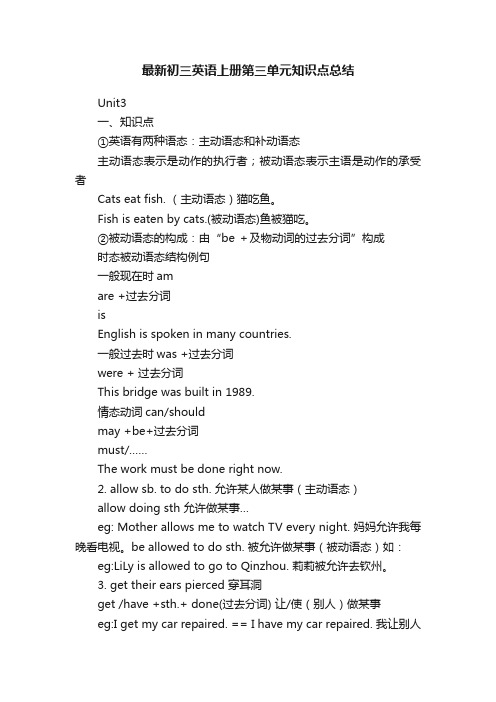
最新初三英语上册第三单元知识点总结Unit3一、知识点①英语有两种语态:主动语态和补动语态主动语态表示是动作的执行者;被动语态表示主语是动作的承受者Cats eat fish. (主动语态)猫吃鱼。
Fish is eaten by cats.(被动语态)鱼被猫吃。
②被动语态的构成:由“be +及物动词的过去分词”构成时态被动语态结构例句一般现在时amare +过去分词isEnglish is spoken in many countries.一般过去时was +过去分词were + 过去分词This bridge was built in 1989.情态动词can/shouldmay +be+过去分词must/……The work must be done right now.2. allow sb. to do sth. 允许某人做某事(主动语态)allow doing sth 允许做某事…eg: Mother allows me to watch TV every night. 妈妈允许我每晚看电视。
be allowed to do sth. 被允许做某事(被动语态)如:eg:LiLy is allowed to go to Qinzhou. 莉莉被允许去钦州。
3. get their ears pierced 穿耳洞get /have +sth.+ done(过去分词) 让/使(别人)做某事eg:I get my car repaired. == I have my car repaired. 我让别人修好我的车4. 形容词+enough 如:beautiful enough足够漂亮enough+名词如:enough food 足够食物enough to 足够…去做…如:She is old enough to go to school.她够大去读书了。
5. stop doing sth. 停止做某事Please stop speaking.请停止说话。
九年级英语上册Unit3知识点整理

九年级英语上册Unit3知识点整理九年级英语上册Unit3知识点整理1.取钱 get se ne2.买一些杂志/邮票 get/bu se agazines3.获取一些有关小镇的信息get se infratin abut the t..Excuse e, d u nA.I thin sB. es, I hpe sC. I’ afraid sD. Srr, I’ afraid nt3.---_______,culd u tell e the 这时问路者仍应有礼貌地向对方表示谢意,说than u an---Than u all the sae.3.at, beside, b与near(1)at“靠近”,往往意为着有目的、有意识的靠近,而b, beside, near只意味着“靠近”。
He sat at the des. He wanted t read.(2)beside“在。
旁边”;b(=ust at t he side f)“就在。
旁边”。
两者一般可通用。
但b比beside语气较强些,并多用于日常用语中。
There is a hspital beside/b the river.注意:指“在某人身边”时,多用beside。
The little b is standing beside his ther.(3)near“在。
附近”或“离。
不远”,它表示的`距离要比b/beside表示的距离远些。
We live near the sea.(表示离海边有些距离)We live b/beside the sea.(表示海就在身边)。
九年级英语上册Unit3知识点归纳
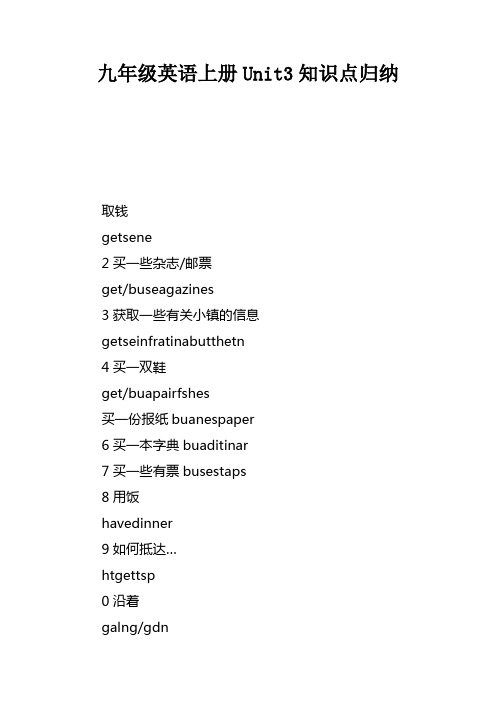
九年级英语上册Unit3知识点归纳取钱getsene2买一些杂志/邮票get/buseagazines3获取一些有关小镇的信息getseinfratinabutthetn4买一双鞋get/buapairfshes买一份报纸buanespaper6买一本字典buaditinar7买一些有票busestaps8用饭havedinner9如何抵达…htgettsp0沿着galng/gdn1在银行的隔壁besidetheban2在右边ntheright/left3在某人的右边nne’sright4去三楼gtthethirdflr向左转turnleft/right6在…之间beteen…and…7走过书店gpastthebstre8做…兴奋beexitedtdsth9从/以…开始start/beginith20没必要慌忙ntneedtrush21有……独特的地方bespeialabut 22加油,过来en23休息室arfrresting24请再说一次pardne2抓住某人的手hldne’shand26摇滚乐队arband27起初atfirst28在去的路上nne’sat 29通过、途经passb30开始玩startplaing31沿走;走上;走近alup32在门边atthedr33在门旁bthedr:34在那个时刻atthattie3来得更早点ealittleearlier36占位子getatable37一些吃的东西sethingteat38最近的银行thenearestban39寄信ailaletter40在购物中心intheshppingenter41寻求帮忙asfrhelp42如何有礼貌的寻求帮htasfrhelpplitel 43学会如何才是礼貌的learnhtbeplite 44在不同的情形indifferentsituatins4利用适当的语言usethesuitable/right/prperlanguage46立足于以…为依照basen47取决于/依托dependn48引入一个请求leadintarequest49停车parne’sar0一个地下停车库anundergrundparinglt1换钱hangene2去的路theat3在一个说英语的的国家inanEnglish-speainguntr 4进行一个短时间的假期学习gnashrtstudvaatin为……感激某人thansbfrdingsth6期待lfrardt+n/ding7醒来aeup8仓促地做某事inarushtdsth9做某事很方便benvenienttd60第一次见到某人eetsbfrthefirsttie61更擅长beebetterat…62使…想起reind…f…63一个用饭的好地址agdplaeteat 二、重点句型nt…until…unevernuntilutrsething凡事只有切身经历了才能了解。
人教版九年级上册unit3知识点

人教版九年级上册unit3知识点Unit 3 知识点九年级上册的 Unit 3 主要涉及到了现在进行时和一般将来时的基本用法,同时还包括了相关的时间状语和频率副词。
本文将结合一些例句和练习来详细介绍这些知识点。
一、现在进行时现在进行时用于描述现在正在进行的动作或状态。
构成为主语+ be 动词(am/is/are)+动词现在分词(-ing)。
例句:1. I am studying for the exam.(我正在复习考试。
)2. She is cooking dinner in the kitchen.(她正在厨房做晚餐。
)指示词“now” 时常和现在进行时连用,表示现在正在进行的动作。
另外,表示一时刻或眼前动作的副词,如“at the moment”, “right now”等也常和现在进行时连用。
例句:1. Don't disturb him. He is studying at the moment.(不要打扰他,他正在学习。
)2. Can I call you back? I am right in the middle of something.(我可以回电话给你吗?我正在忙着呢。
)二、一般将来时一般将来时表示将来要发生的动作或存在的状态。
构成为主语+ will + 动词原形。
例句:1. They will go to the beach next weekend.(他们下个周末要去海滩。
)2. I will help you with your homework after school.(放学后,我会帮你做作业。
)在一般将来时的句子中,常常会出现以下时间状语:tomorrow (明天)、next week(下周)、next month(下个月)、next year(明年)等。
这些表示将来的时间状语可以帮助我们更准确地理解句子的时间表达。
例句:1. She will visit her grandparents next month.(她下个月要去看她的祖父母。
2020人教版九年级英语上Unit3知识点整理
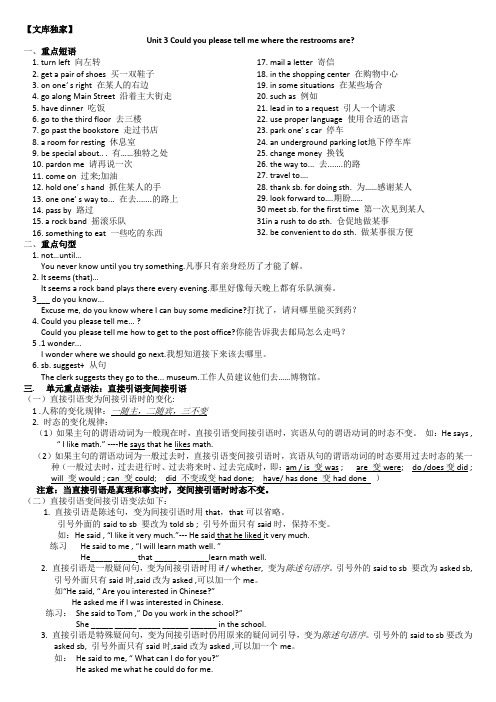
【文库独家】Unit 3 Could you please tell me where the restrooms are?一、重点短语1. turn left 向左转2. get a pair of shoes 买一双鞋子3. on one’ s right 在某人的右边4. go along Main Street 沿着主大街走5. have dinner 吃饭6. go to the third floor 去三楼7. go past the bookstore 走过书店8. a room for resting 休息室9. be special about.. . 有……独特之处10. pardon me 请再说一次11. come on 过来;加油12. hold one’ s hand 抓住某人的手13. one one’ s way to... 在去.......的路上14. pass by 路过15. a rock band 摇滚乐队16. something to eat 一些吃的东西17. mail a letter 寄信18. in the shopping center 在购物中心19. in some situations 在某些场合20. such as 例如21. lead in to a request 引人一个请求22. use proper language 使用合适的语言23. park one’ s car 停车24. an underground parking lot地下停车库25. change money 换钱26. the way to... 去.......的路27. travel to….28. thank sb. for doing sth. 为……感谢某人29. look forward to….期盼……30 meet sb. for the first time 第一次见到某人31in a rush to do sth. 仓促地做某事32. be convenient to do sth. 做某事很方便二、重点句型1. not…until…You never know until you try something.凡事只有亲身经历了才能了解。
九年级上册英语Unit3 知识点归纳整理

Unit 3 Could you please tell me where the restrooms are?词形转换1. normal adj.---adv. normally 通常地2. suggest v.---n. suggestion 建议2. staff n.---pl. staffs 职员3. center n.--- adj. Central 中心的4. east adj.---adj. eastern东方的5. west adj.---adj. western 西方的6. north adj.---adj.northern 北方的7. south adj.---adj. Southern南方的8. fascinate n.----adj. fascinating 迷人的9. speak v.--- n. speaker发言者10. direct adj.--- n. direction 方向11. correct adj.--- a dv. Correctly 正确地12. expensive adj./dear---(反义) inexpensive/cheap便宜的13. convenient adj---(反义)inconvenient ---n.convenience便利14. crowd v.---adj. crowded---(反义) uncrowded不拥挤的15. polite adj.--- adv. politely---(反义) impolite---adv. i mpolitely不礼貌地固定搭配1. start doing sth./ to do sth.开始做某事2. end up with /doing以....结尾3. suggest doing sth. 建议做某事.4. a good place to do sth. 做某事的好地方5. need to do sth. 需要做某事6. be excited to do sth. 做...很激动7. request sb. to do sth.要求某人做某事8. tell sb.(not) to do sth.告诉某人(不)做...9. turn left/ right左/右转10. on one's left/ right在(某人的)左/右边11. promise to do sth. 承诺做某事12. between…and... 在…和…之间13. in (the) front of在……前面14. get on / off the bus上/下公共汽车15. become better at doing sth. 更擅长于做某事16. on one’s way to… 在某人去…的路上17. go along the street 沿着这条街走18. look+adj . 看起来怎么样19. how/what/which/ to do sth. 20. thank sb. for (doing )sth. 因(做)某事而感谢某人知识拓展a pair of shoes一双鞋have dinner吃晚餐get some money取钱center street 中心街on the second floor在二楼amusement park游乐园hold my hand握着我的手go east向东走ask for help politely礼貌地寻求帮助polite questions有礼貌的问题less polite更没礼貌more polite更有礼貌delicious food美味的食物school trip学校旅行winter clothes冬衣shopping mall/center 购物商场/中心e-mail address邮件地址重点句型1. I wonder if/ whether+从句2. Do you know where/what/if/ whether+从句3.问路表达方式:(1) Excuse me. Could you tell /show me the way to..? 打扰一下,你能告诉/指给我去…的路吗?(2) Could you please tell me how to get to..? 请你告诉我怎样到…好吗?(3) Do you know if there is a ... around here? 你知道这附近是否有…吗?(4) Where is the nearest…, please?请问最近的…在哪里?4. Could you please do sth. ? =Would you please. . . ? 请你做某事好吗?①肯定回答:Sure. /Of course. /Certainly. /No problem.②否定回答:Sorry, I can't. /I'm sorry, but...③Could you please do sth. ? "的否定形式为:Could you please not do sth. ?请你不要做某事好吗?。
- 1、下载文档前请自行甄别文档内容的完整性,平台不提供额外的编辑、内容补充、找答案等附加服务。
- 2、"仅部分预览"的文档,不可在线预览部分如存在完整性等问题,可反馈申请退款(可完整预览的文档不适用该条件!)。
- 3、如文档侵犯您的权益,请联系客服反馈,我们会尽快为您处理(人工客服工作时间:9:00-18:30)。
Unit 3 Could you please tell me where the restrooms are?
词形转换
1. normal adj.---adv. normally 通常地
2. suggest v.---n. suggestion 建议
2. staff n.---pl. staffs 职员
3. center n.--- adj. Central 中心的
4. east adj.---adj. eastern东方的
5. west adj.---adj. western 西方的
6. north adj.---adj.northern 北方的
7. south adj.---adj. Southern南方的
8. fascinate n.----adj. fascinating 迷人的9. speak v.--- n. speaker发言者
10. direct adj.--- n. direction 方向11. correct adj.--- a dv. Correctly 正确地
12. expensive adj./dear---(反义) inexpensive/cheap便宜的
13. convenient adj---(反义)inconvenient ---n.convenience便利
14. crowd v.---adj. crowded---(反义) uncrowded不拥挤的
15. polite adj.--- adv. politely---(反义) impolite---adv. i mpolitely不礼貌地
固定搭配
1. start doing sth./ to do sth.开始做某事
2. end up with /doing以....结尾
3. suggest doing sth. 建议做某事.
4. a good place to do sth. 做某事的好地方
5. need to do sth. 需要做某事
6. be excited to do sth. 做...很激动
7. request sb. to do sth.要求某人做某事8. tell sb.(not) to do sth.告诉某人(不)做...
9. turn left/ right左/右转10. on one's left/ right在(某人的)左/右边11. promise to do sth. 承诺做某事12. between…and... 在…和…之间
13. in (the) front of在……前面14. get on / off the bus上/下公共汽车
15. become better at doing sth. 更擅长于做某事16. on one’s way to… 在某人去…的路上17. go along the street 沿着这条街走18. look+adj . 看起来怎么样
19. how/what/which/ to do sth. 20. thank sb. for (doing )sth. 因(做)某事而感谢某人知识拓展
a pair of shoes一双鞋have dinner吃晚餐get some money取钱center street 中心街on the second floor在二楼amusement park游乐园hold my hand握着我的手go east向东走ask for help politely礼貌地寻求帮助polite questions有礼貌的问题less polite更没礼貌more polite更有礼貌delicious food美味的食物school trip学校旅行winter clothes冬衣shopping mall/center 购物商场/中心e-mail address邮件地址
重点句型
1. I wonder if/ whether+从句
2. Do you know where/what/if/ whether+从句
3.问路表达方式:
(1) Excuse me. Could you tell /show me the way to..? 打扰一下,你能告诉/指给我去…的路吗?
(2) Could you please tell me how to get to..? 请你告诉我怎样到…好吗?
(3) Do you know if there is a ... around here? 你知道这附近是否有…吗?
(4) Where is the nearest…, please?请问最近的…在哪里?
4. Could you please do sth. ? =Would you please. . . ? 请你做某事好吗?
①肯定回答:Sure. /Of course. /Certainly. /No problem.
②否定回答:Sorry, I can't. /I'm sorry, but...
③Could you please do sth. ? "的否定形式为:
Could you please not do sth. ?
请你不要做某事好吗?。
